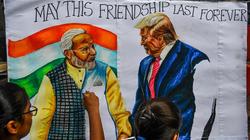 US President Donald Trump plans to mention the sensitive issue of religious freedom in India during his upcoming meetings with Prime Minister Narendra Modi during a state visit later this week, a senior administration official has announced.
US President Donald Trump plans to mention the sensitive issue of religious freedom in India during his upcoming meetings with Prime Minister Narendra Modi during a state visit later this week, a senior administration official has announced. RNA - Trump, who is scheduled to visit India on Monday, will discuss the two countries’ “shared traditions of democracy and religious freedom,” Reuters reported Saturday, quoting the unnamed senior official speaking in a conference call ahead of the visit.
“He will raise these issues, particularly the religious freedom issue, which is extremely important to this administration,” he added, despite the fact that Trump himself has been widely censured at home and abroad for imposing a travel ban on several Muslim-majority countries in a purported move to guard against terrorism.
Modi’s rightist government, backed by Hindu nationalists, has also faced massive protests at home and heavy criticism abroad, including the United States, for enacting the so-called citizenship law that is widely viewed as discriminating against Muslims.
The controversial move has intensified concerns that his administration in undermining India’s long-held secular traditions.
The measure came months after Modi’s administration also withdrew the special autonomy given to the disputed, Muslim-majority territory of Kashmir in efforts to tighten its hold on the restive region. Indian authorities further took into custody dozens of political opponents and pro-independence leaders and imposed a communications blackout in the Himalayan district.
This is while Modi’s ruling Hindu nationalist Bharatiya Janata Party rejects allegations of bias against the country’s more than 180 million Muslims.
It has strongly rebuked foreign criticism, insisting that the brutal crackdown in Kashmir and the new citizenship law were internal matters. New Delhi has also clashed with Muslim-majority countries such as Turkey and Malaysia in recent months after they censured the government’s anti-Muslim policies.
According to the US official, Modi had boasted about his government’s priority of inclusive growth for everyone, including religious minorities, soon after winning a second term in office last year.
“And I think that the President (Trump) will talk about these issues in his meetings with Prime Minister Modi and note that the world is looking to India to continue to uphold its democratic traditions, respect for religious minorities,” he added.
The development comes as four US senators wrote to Secretary of State Mike Pompeo earlier this month, insisting that Modi’s measures in Kashmir as well as the citizenship laws were troubling and “threaten the rights of certain religious minorities and the secular character of the state.”
The bipartisan group of senators also demanded information from the State Department for information about the number of political detainees in Kashmir, restrictions on the internet and cell phone service, and access for foreign diplomats, journalists and observers.
According to Press TV, they also voiced concern over New Delhi’s suppression of protesters opposing the citizenship law, which lays out a path to Indian nationality for six religious groups from neighboring countries including Hindus, Sikhs and Christians, but not Muslims.
Meanwhile, Indian officials have dismissed suggestions of an early trade deal with Washington during Trump’s upcoming visit to the country, saying New Delhi will not rush into an agreement with the US president.
Indian foreign ministry spokesman Raveesh Kumar said on Thursday that “complex negotiations” are underway for reaching an agreement, but "these are complex negotiations. We would not like to rush into a deal."
“We do hope to reach an understanding with an outcome that strikes the right balance for both sides,” he added amid wide expectations of a major trade agreement during Trump’s visit to the country.